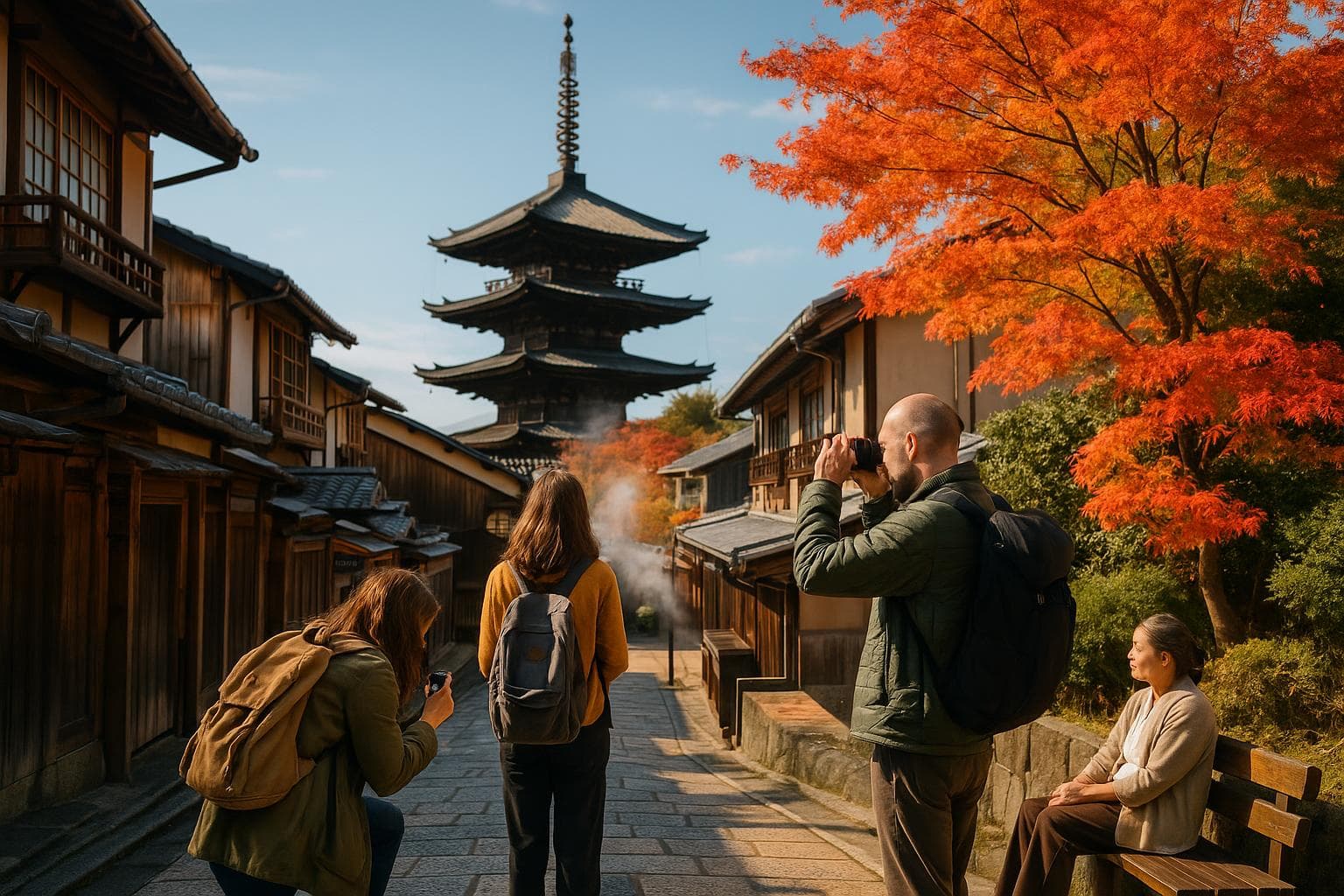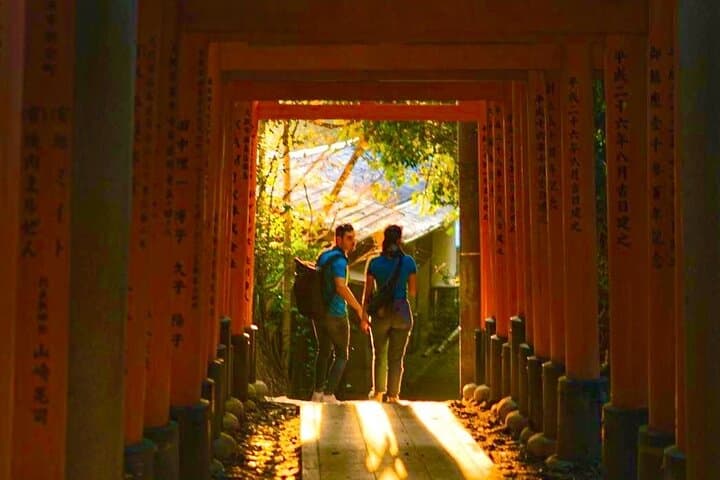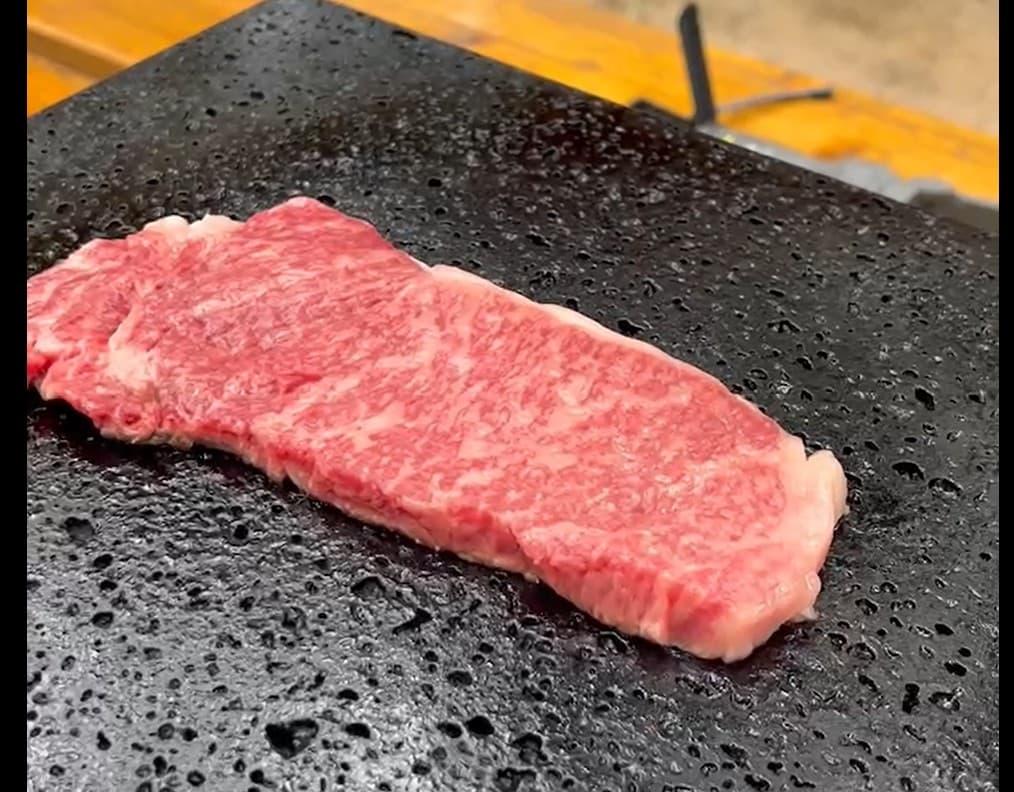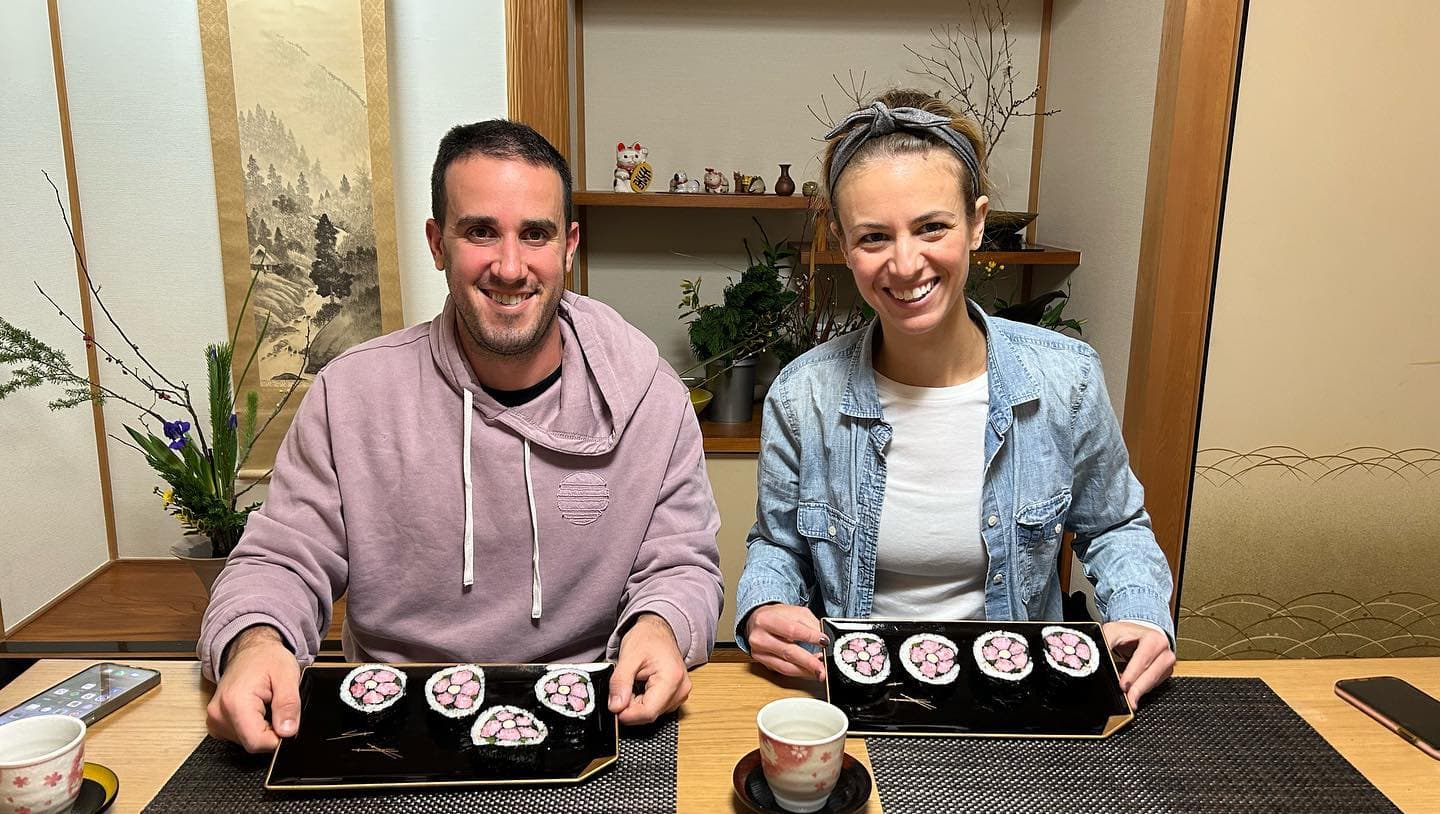Kyoto in 3 Days for Mindful - Sagano Bamboo Grove & Tenryū-ji (Arashiyama)

A three-day, slow-paced journey through Kyoto’s most meditative gardens, quiet temple corners, and restorative hot springs timed for maple season. Each day balances gentle movement, seated reflection, calm meals, and long pauses to breathe and absorb the colors and textures of autumn.
Highlights
- Sagano Bamboo Grove & Tenryū-ji (Arashiyama)
- Okochi Sansō Garden and riverside tofu kaiseki
- Kokedera (Saiho-ji) moss garden (reservation required)
- Ryōan-ji rock garden & Eikandō maple viewing
- Philosopher’s Path morning practice
- Kurama mountain hike and Kurama Onsen
Itinerary
Day 1
Arashiyama: settle into slow rhythms among bamboo, temple gardens, and riverside views. Gentle walking, mindful pauses, and a calm lunch by the water.
Morning quiet walk — Sagano (Arashiyama) Bamboo Grove
Begin before the crowds with a slow, mindful walk through the Sagano Bamboo Grove. Keep a calm pace, pause for breathing and to notice light through the stalks.
Tips from local experts:
- Arrive before 08:00 to enjoy near-solitude and soft morning light; bring a small sitting mat to pause off-path quietly.
- The path can be narrow and uneven; use layered clothing for cool autumn mornings and slow down on damp areas.
- Avoid noisy photography — use this time for contemplative observation; pick a single view to hold for 1–2 minutes between breaths.
Tenryū-ji Temple — Zen garden & reflective stroll
A short walk from the grove: wander Tenryū-ji’s strolling garden, designed for mindful viewing of the pond and autumn colors.
Tips from local experts:
- Head to the garden viewing platforms and sit for 10–15 minutes facing the pond to practice soft eye-focus and breath awareness.
- Paths have stone steps; wear shoes with grip and allow extra time if mobility is limited.
- Visit the temple shop briefly for a small incense stick to scent your jacket — a tactile reminder of your visit for later reflection.
Okochi Sansō Garden — contemplative garden & tea
Explore Okochi Sansō’s layered gardens and finish with a quiet bowl of matcha in their tea house overlooking the valley.
Tips from local experts:
- Take the slower, higher paths for quieter viewpoints and sit on the benches to practice a short seated body-scan.
- There are gentle inclines and steps; pace yourself and pause at lookout points to enjoy the garden’s textures and autumn palette.
- When offered matcha, sip slowly and fully attend to aroma and warmth — treat it as a short guided meditation.
Lunch: Shoraian — riverside tofu kaiseki (Arashiyama)
A serene tofu-focused lunch overlooking the river; intentionally slow courses highlight local soy and seasonal produce.
Tips from local experts:
- Reserve ahead and request a riverside seat for quiet water views that aid digestion and reflection between courses.
- Take pauses between dishes—use chopstick rests to place your utensils down and breathe between bites.
- If you prefer simpler portions, ask the staff to pace courses more slowly; they are attentive to calm diners.
Togetsukyo Bridge & slow riverside stroll
A gentle post-lunch walk along the Ōi River and across Togetsukyo Bridge — ideal for slow observation of river-sound and birds.
Tips from local experts:
- Walk the lesser-used riverside paths on the north bank for quieter observation points and bench seating.
- Listen for the subtle sounds (water, wind in trees) and use them as anchors to return to the present when thoughts wander.
- If seated on the bridge railing, face upstream for calmer reflections and cooler light for photography.
Late-afternoon pause: riverside bench break
Find a quiet bench or tea shop terrace to rest; journal, breathe, or tea-sip while watching the light change.
Tips from local experts:
- Choose a bench with partial shade to ground yourself; use this moment for a 10-minute silent gratitude or reflection practice.
- If planning to sketch or journal, bring a small pen notepad to capture sensory details rather than long descriptions.
- Avoid screens—try a single photograph and then close your phone to remain present.
Dinner: Yoshimura Arashiyama — soba by the water
A calm, seasonal soba dinner with river views — a quiet way to end a reflective day in Arashiyama.
Tips from local experts:
- Request a quieter corner table and ask staff to serve courses with mindful pauses between plates.
- Savor each texture slowly—cold and hot soba are both meditative if eaten with attention to breath.
- If you’d like a lighter meal, order an a la carte dish and pair it with green tea rather than alcohol to support restful sleep.
Day 2
Northern and eastern temples: moss, rock gardens, and maple viewing with intentional pacing. Includes a mix of reserved and unstructured moments to keep a calm pace.
Kokedera (Saiho-ji) — moss garden (reservation required)
A guided, reserved viewing of the famed moss garden (Koke-dera). This is a contemplative experience—book weeks ahead and follow temple rules.
Tips from local experts:
- Reserve your slot well in advance (email/phone is required) and bring identification—arrive 15 minutes early for a quiet orientation.
- The visit includes a short seated chant and walking; wear quiet-soled shoes and a light jacket for the cooler morning moss air.
- Because photography is restricted, bring a small sketchbook or simply sit in silence to engrain the textures of moss and maple.
Ryōan-ji — rock garden contemplation
Spend a slow hour with the minimalist Ryoan-ji rock garden, practicing seated observation and soft, steady breathing.
Tips from local experts:
- Sit on the viewing veranda and time three full 5-minute observation windows separated by gentle stretches.
- The veranda can be chilly in autumn; bring a simple shawl to sit comfortably and stay present.
- Avoid the loud group tours—if a tour arrives, soften your attention to breath or move slightly along the veranda to a quieter spot.
Lunch: Okutan Nanzenji — traditional yoshoku/tofu set
A soothing, local meal near the Nanzen-ji area focusing on slow-cooked tofu and seasonal vegetables.
Tips from local experts:
- Order a set meal and ask for a gentle pacing of courses — use the time to practice mindful chewing and full attention to flavors.
- Request a seat away from the main entrance to avoid foot-traffic interruptions.
- If mobility or stairs are a concern, call ahead to request a ground-floor table; the restaurant is accommodating to slower-paced diners.
Nanzen-ji Temple grounds — quiet strolling & aqueduct
Walk the broad temple grounds, notice stone textures and water sounds along the 19th-century brick aqueduct.
Tips from local experts:
- Follow the quieter side paths around the gardens and pause near the aqueduct for a 10-minute silent listening practice.
- There are steps and some uneven paths; take a walking stick if helpful and wear good shoes for mossy stones.
- Consider a slow walking meditation: step-count the exhale for 8 steps, inhale for 6, then reset to natural breathing between viewpoints.
Eikandō (Zenrin-ji) — maple viewing and quiet corners
Eikandō’s maple avenue is a highlight in autumn. Explore less-traveled corners and sit in the small meditation garden to absorb color and stillness.
Tips from local experts:
- Arrive mid-afternoon when light warms the leaves — head to the upper garden for quieter vantage points.
- Seek the small side alcoves (often less crowded) to sit and practice 5–10 minute silent observation of a single maple leaf.
- If the main path is crowded, circle the outer perimeter paths where local visitors often pause for longer breaths.
Ippodo Tea Co. — calm tea tasting & reflection
Wind down with a focused tea-tasting session; Ippodo’s teas are ideal for mindful sipping and grounding.
Tips from local experts:
- Request a guided tasting if available; attend to aroma, warmth, and mouthfeel as anchors to the moment.
- Choose a low table or corner seat for quieter ambiance and less foot traffic.
- Bring a small note in which to jot one sensory impression after each cup to deepen memory of the experience.
Evening: Gion quiet stroll at dusk
A short, unhurried walk through the quieter backstreets of Gion — observe wooden machiya facades and let the evening calm settle.
Tips from local experts:
- Head into the side streets off Hanami-koji for fewer tourists and more intimate architecture to study silently.
- Look for small lantern-lit courtyards and sit briefly on a bench to do a 5-minute breath-counting practice.
- Avoid busy restaurant areas; choose a slow tea house or simply stroll with no agenda to keep the evening relaxed.
Day 3
Morning practice along the Philosopher’s Path, a midday Zen session, then a restorative mountain walk and onsen soak at Kurama to close the trip.
Morning: Gentle yoga & meditation at Philosopher’s Path
A calming outdoor yoga and breathwork session along the canal path — self-guided or with a small instructor if previously arranged.
Tips from local experts:
- Arrive before 08:00 to claim a quiet riverside spot; a small yoga mat or large scarf is enough for gentle stretches.
- Practice slow, joint-friendly movements and a 10-minute seated breath meditation facing the water.
- Dress in layers for cool morning air and bring a small towel to sit on for longer meditative pauses.
Shōsei-en Garden — quiet stroll near Kyoto Station
A lesser-known garden with ponds and shaded paths — an easy next pause before a midday seated meditation.
Tips from local experts:
- This garden is compact and calm; find a shaded bench to practice a 15-minute body-scan meditation after the walk.
- It’s near Kyoto Station but remains under-visited; choose off-peak hours to keep the experience private.
- Bring a small pair of binoculars if you enjoy watching birds and small wildlife for mindful nature observation.
Shunkoin Temple — guided Zen meditation session (book ahead)
An accessible English-language Zen meditation at Shunkoin — a practical and peaceful workshop suitable for mindful travelers.
Tips from local experts:
- Book the session in advance (email/phone) and arrive 10–15 minutes early to settle your shoes and belongings.
- Wear layers and easy-to-remove shoes: the temple provides cushions but you may prefer your own for comfort.
- Plan for a quiet lunch afterward; allow your mind 30 minutes of silence before speaking to integrate the practice.
Lunch: Omen Ginkakuji — simple, warmly paced udon
A soothing noodle lunch near Ginkaku-ji — light, restorative fare that won’t weigh you down before the afternoon journey to Kurama.
Tips from local experts:
- Ask for a calmer seating area away from the entrance; request water instead of alcohol for a gentle afternoon energy.
- Eat slowly with mindful awareness of temperature and texture to conserve energy for the upcoming hike.
- If the restaurant is busy, request takeaway-style packaging for a bench picnic nearby to continue a peaceful rhythm.
Transfer: Train to Kurama village & short walk to trailhead
Travel north by Eizan Railway to Kurama — a calm scenic ride that serves as a transition from urban gardens to mountain forest.
Tips from local experts:
- Sit on the right side of the train for the best valley views; keep conversation low to preserve a meditative atmosphere.
- Have cash ready for the small local train ticket machine; purchase a return ticket if you prefer not to worry later.
- Carry a small daypack with water, a warm layer, and a compact umbrella — mountain weather changes quickly in autumn.
Kurama-dera hike — forest meditation to the temple
A 40–60 minute uphill forest walk to Kurama-dera; practice walking meditation and focus on breath, foot sensation, and canopy light.
Tips from local experts:
- Move slowly uphill, using the rhythm of your steps as an anchor; stop every 10–15 minutes to do a 1–2 minute silent practice.
- Trail surfaces can be uneven with roots—wear supportive shoes and consider trekking poles for balance.
- Bring a small handkerchief to wipe hands before offering a quiet bow at the temple; local etiquettes appreciate calm presence.
Kurama Onsen — restorative hot-spring soak and slow dinner
Rejuvenate in Kurama Onsen’s outdoor baths; soak slowly and then enjoy a simple, restorative dinner in the onsen dining area or nearby ryokan.
Tips from local experts:
- Reserve a bathing time slot if possible to avoid crowds; begin with a short cool shower and enter the bath slowly to acclimate.
- Stay hydrated and limit soak time to 10–15 minutes per round; alternate with short rest breaks in the relaxation area.
- Choose a light dinner and sit quietly afterward to let the bath’s warmth integrate into your evening — avoid strong stimulants or heavy alcohol.
Return transfer to central Kyoto — gentle close
Take the Eizan train back to Kyoto as the final calm leg of the journey; use this time to reflect quietly or journal one insight from the trip.
Tips from local experts:
- Choose a window seat and allow the passing scenery to be your final reflection tool—avoid social media to keep the evening restful.
- Keep a small notepad or voice memo ready to capture a short intention or gratitude note from the trip.
- If returning late, arrange slow transport (train/taxi) to your lodging and request a quiet room if possible for restful sleep.
Itinerary Attributes
| Days | 3 |
| Highlights | 6 |
| Season | Autumn |
| Month | November |
| Persona | Mindful |
| Transfers | 2 |
| Restaurants | 4 |
| Total Activities | 20 |
| Total Places | 20 |
| Activities Types | Outdoor, Attraction, Restaurant, Neighborhood, Break, Experience, Culture, Transfer |



